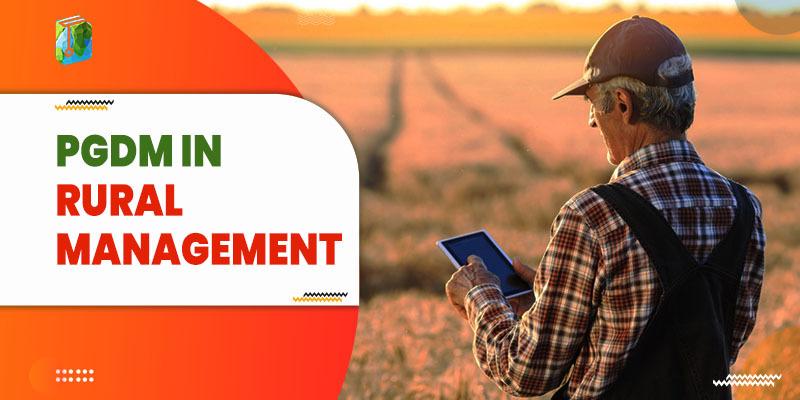Introduction
PGDM course in Rural Management is a study of rural planning, organizing, economy, and maintaining a business in rural areas and its related fields. This course covers different streams such as cooperative Management, Public Policy Management, Development Management, Social Management, Rural Projects Management, etc.
Here in this article, we are going to discuss more about the Post Graduate Diploma course in Rural Management.
PGDM in Rural Management
Through this course, students can learn about the challenging situations of rural sectors. Through this course students can also become responsible for performing actions that are beneficial in conducting activities in developmental organizations as well as rural cooperation. This course can open different doors of opportunity for the students who want to work for the development of the rural sector in India.
Highlights of PGDM in Rural Management
| Course level | Postgraduate |
| Duration | One to two years |
| Examination Type | Semester based |
| Eligibility | Graduation degree in any stream with minimum 50% aggregate marks |
| Admission process | On the basis of counseling after clearing any of the Entrance Tests i.e. CAT, GMAT, XAT for various colleges |
| Course Fee | INR 6.25 Lacs |
| Average salary | INR 1.5 Lacs to 3.5 Lacs |
Top Institutes for Post Graduate Diploma in Rural Management
| College/Institute | State |
| Bangalore University | Karnataka |
| Holy Cross College (Autonomous) | Tamil Nadu |
| Shyam Institute of Management & Technology (SIMT) | Delhi |
| University of North Bengal | West Bengal |
| Indira Gandhi National Open University | Delhi |
| Goodwill College | Uttar Pradesh |
| Yashwantrao Chavan Academy of Development Administration | Pune |
| Mahatma Jyoti Rao Phoole University | Rajasthan |
| Institute of Rural Management (IRM Anand) | Gujarat |
| Institute of Rural Management | Rajasthan |
| International Institute for Learning in Management Business School | New Delhi |
| Jyotiba Institute of Management &Technology | Rajasthan |
| Prin L.N. Welingkar Institute of Management Development & Research | New Delhi |
Read More about:
Eligibility & Admission Process for PGD in Rural Management
Eligibility Criteria
To do this course, a candidate should have a Bachelor’s degree from a recognized university with a minimum of 50% marks (General category) and 45% marks (SC/ ST category).
Admission Process
The admission process is based on entrance exam as well as personal interview. Still, various institutes conduct their entrance tests for offering admission to the candidates. Hence, the admission process is based on the institute’s rules. Here is a list of the entrance exams that are applicable for admission:
As per the standard process, admission will be given according to the scorecard of the entrance exam and performance in the personal interview.
Syllabus for PGD in Rural Management
Term I
- Financial Management
- Managerial Analysis
- Organizational Behavior
- Quantitative Analysis of Rural Management
- Economic Analysis of Rural Management
- Rural Society and Polity
- Rural Research Methods
- Rural Livelihood Systems
Term II
- Marketing Management
- Financial Management
- Production and Operations Management
- Operations Research
- Collective Action and Cooperation
- Macro-Economic Perspectives
- Understanding Organisations
- Gender Development
Term III
- Human Resource Management
- Development Theories and Practices
- Natural Resources and Sustainability
- Costing Control Systems
Term IV
- Project Management
- Strategic Management
- Managing Collectives
- Rural Development
Term V
- Managing for NGOs
- Public Systems Management
- Financial and Commodity Derivatives
- Rural Finance
- Rural Marketing
- Values and Ethics Management
- Social Entrepreneurship
Conclusion
In this article, we have provided complete information regarding the post Graduate Diploma in Rural Management available in India. So as we know, this PGD course in rural management is a study of rural planning, organizing, economy, and maintaining a business in rural areas and its related fields. This course covers different streams such as Cooperative Management, Public Policy Management, Development Management, Social Management, Rural Projects Management, etc.
People are also reading:

